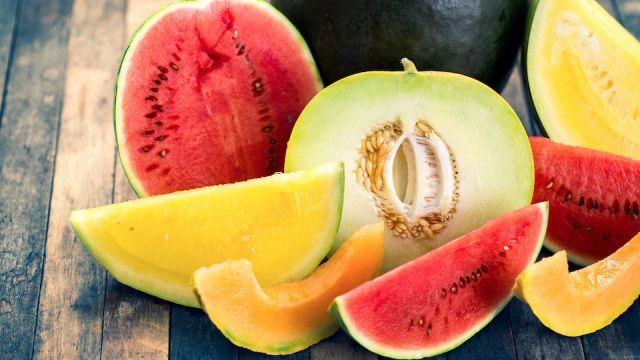
Humans have been enjoying the sweet juicy flesh of melons for over 4,000 years. While melons grow wild in various parts of Africa, they are believed to have originated in different regions of Asia. Melons are members of the gourd family, Cucurbitaceae, which encompasses cucumbers, all varieties of squash, pumpkins, and more, totaling over 100 different species.
The most popular melons consumed in the United States are cantaloupe, honeydew, and watermelon, all of which include different sub-varieties. These warm-weather, vine-grown fruits are best-suited to regions with long summer seasons. Melons come in all sizes, with some as small as a softball, while others weigh in at over 15 pounds.
Cantaloupe and honeydew are noted for their net-like outer covering, while the rind of a watermelon is often shiny and smooth. The sweet, pulpy flesh of these melons contains an abundance of seeds, except for that of the seedless watermelon, which is a product of hybridization between two different varieties. The resulting “seedless” watermelon contains white seed coatings scattered throughout its red flesh.
Melons pack a powerful nutritional punch
Underneath the hearty rind, melons are rich in nutrients including:
- B Vitamins
- Carotenoids
- Copper
- Fiber
- Lycopene
- Magnesium
- Potassium 6
- Vitamin A
- Vitamin C
- Vitamin K
- Zinc
Health benefits of melons
Eye health – Cantaloupe is an excellent source of Vitamin A, which plays many roles in the body but is particularly important in eye health and in warding off eye diseases that can result in blindness or impaired vision. The pale orange flesh contains both alpha- and beta- carotene along with their derivatives, lutein, beta-cryptoxanthin, and zeaxanthin.
Decreased risk of metabolic syndrome -The carotenes, along with the flavonoid luteolin, the antioxidant acids known as ferulic and caffeic acid, and the anti-inflammatory cucurbitacins B and E work synergistically to protect against metabolic syndrome. This increasingly more common condition includes high blood pressure, blood fats, and blood sugar combined with excessive oxidative stress and inflammation in the body. Researchers have found that individuals who consume the most cantaloupe experience a decreased risk of developing metabolic syndrome.
Trace minerals – Honeydew melon is similar in size and shape to that of the cantaloupe, yet the inner flesh is a pale green color. Though not as sweet as its cousin, the honeydew is an excellent source of several trace minerals, including copper, which aids in cell regeneration and muscle and tissue repair. The honeydew also boasts similar potassium concentrations to that of a banana, yet with less than half the calories.
Heart health – Numerous species of watermelon exist, ranging from small sizes with an abundance of seeds to far larger, seedless varieties. Rich in numerous phytonutrients, the watermelon is the most commonly consumed fruit-based source of the carotenoid lycopene in the United States. Lycopene plays an important role in cardiovascular health as does the amino acid citrulline, also found in abundance in watermelons. Citrulline is converted into another amino acid, arginine, by the kidneys. Once converted, arginine is responsible for improving blood flow throughout the body, greatly decreasing the risk of developing cardiovascular disease or stroke.
Pick the best melon
Selecting ripe melons is important, as their phytonutrient content increases as they ripen. Ripe melons should weigh slightly heavier than you would expect. This is due to the increased water content of ripe melons versus their less ripe counterparts. A slight tap on the melon will also help determine its ripeness. If the resounding sound is deep, then the fruit is more ripe. A hollow, light sound means the melon needs more time to reach its peak ripeness.
Cucumber Melon Juice
To enjoy melon in a new and exciting way, try this refreshing summer drink
Ingredients:
- 1 1/2 cucumbers
- 1 lime, peeled
- 3/4 cup honeydew melon, chopped
- 1 inch of ginger root
To make: Process all ingredients through your juicer.
-Susan Patterson

